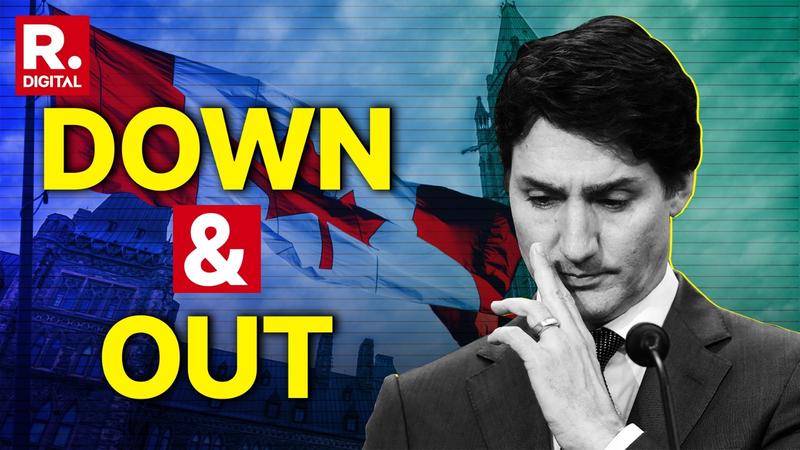Published 18:48 IST, January 6th 2025
From Baseless Allegations to Resignation: How Trudeau's India Gambit Cost Him The PM Chair
Isolated within his own Liberal Party, Trudeau has been accused of using his baseless allegations against India to deflect from mounting domestic challenges.

New Delhi: Canadian Prime Minister Justin Trudeau was grappling with a political crisis which ultimately led to his resignation. Briefing media, Trudeau on Monday night announced his resignation, asserting that “internal battles” mean he “cannot be the best option” in the next election.
Isolated within his own Liberal Party, Trudeau has been accused of using his baseless allegations against India to deflect from mounting domestic challenges, including a faltering economy and growing internal party dissent. His accusations regarding India, particularly over the Nijjar case, have further strained bilateral relations, damaging Canada's ties with one of the world’s largest economies. Trudeau's departure could offer Canada a chance to rebuild its relationship with global superpower India, which has been severely affected by accusations that his government has been sympathetic to Khalistani elements. A new leadership could pave the way for a more constructive and balanced approach to India-Canada relations.
Trudeau's India Gambit
Trudeau's political troubles deepened following his September 2023 allegations that India was involved in the killing of Khalistani terrorist Hardeep Singh Nijjar, who was shot outside a Sikh temple in Canada. India strongly dismissed the claims as "absurd," while Trudeau's assertion that India sponsors criminal activities has drawn significant criticism, both domestically and internationally.
In response, India expelled six Canadian diplomats and recalled its envoy to Ottawa after Canada attempted to question Indian officials as "persons of interest" in the Nijjar case. Tensions were further fueled by pro-Khalistan activities in Canada, including an attack on a Hindu temple near Toronto, worsening relations between the two countries.
India has consistently denied any involvement in Nijjar’s murder, which the National Investigation Agency (NIA) has linked to terrorist activities. India also accused Trudeau’s government of pandering to Khalistani sympathizers for political advantage.
Despite discussions at international forums like the G20 Summit, Canada has failed to provide conclusive evidence connecting India to Nijjar's killing. Critics argue that the allegations were designed to appeal to the Khalistani Sikh vote base in Canada, a politically motivated move that has backfired, distracting from more urgent national issues.
Rebellion Within The Liberal Party
Several prominent Liberal Party MPs, including Sean Casey and Ken McDonald, called for Trudeau to step down due to dissatisfaction with his leadership. Reports indicated that over 20 Liberal MPs signed a petition demanding his resignation.
The December resignation of Chrystia Freeland, Deputy Prime Minister and Finance Minister, marked a massive blow to Trudeau's government. Freeland's departure was reportedly due to policy disagreements, particularly over Trudeau’s handling of potential U.S. tariffs and his economic strategies.
Trudeau, attempting to downplay the situation, remarked in December, “Like most families, sometimes we have fights around the holidays. But of course, like most families, we find our way through it. I love this country, I deeply love this party, I love you guys, and love is what families are all about.” However, Freeland, in her resignation letter, sharply criticized Trudeau and his "costly political gimmicks," expressing a far less affectionate sentiment. Following her exit, Trudeau largely disappeared from public view, spending more time at a ski resort rather than addressing media or participating in public events.
To add to the turmoil, the Liberal Party suffered losses in two recent by-elections. Prominent figures, including New Democratic Party (NDP) leader Jagmeet Singh, have threatened to introduce a motion in Parliament to topple Trudeau’s government when the House resumes on January 27.
Leadership Challenges
With Trudeau's resignation, the Liberal Party will face a big challenge in finding a leader with widespread appeal. The interim leader would be ineligible to run for the permanent position, and the leadership selection process could take months, leaving the party exposed as federal elections approach later this year.
Potential successors, such as Dominic LeBlanc, Melanie Joly, Francois-Philippe Champagne, and Mark Carney, have been mentioned, but the lengthy leadership race could further undermine the party's prospects at the polls.
Meanwhile, the Conservative Party, under Pierre Poilievre's leadership, holds a strong lead in public opinion polls, tapping into widespread frustration with the economy. Poilievre had pledged to repeal Trudeau’s carbon tax and tackle Canada's housing crisis. Some polls indicated that the Conservatives are ahead of the Liberals by a double-digit margin.
Updated 22:18 IST, January 6th 2025




